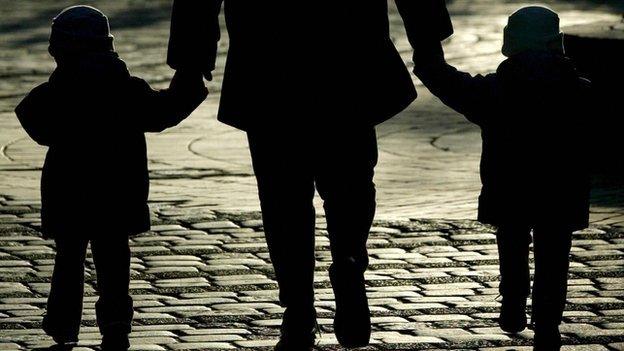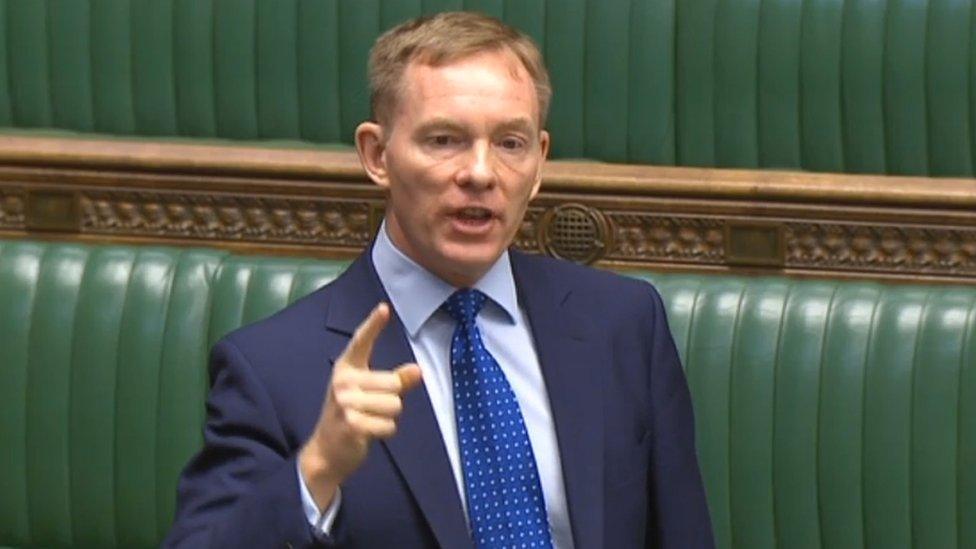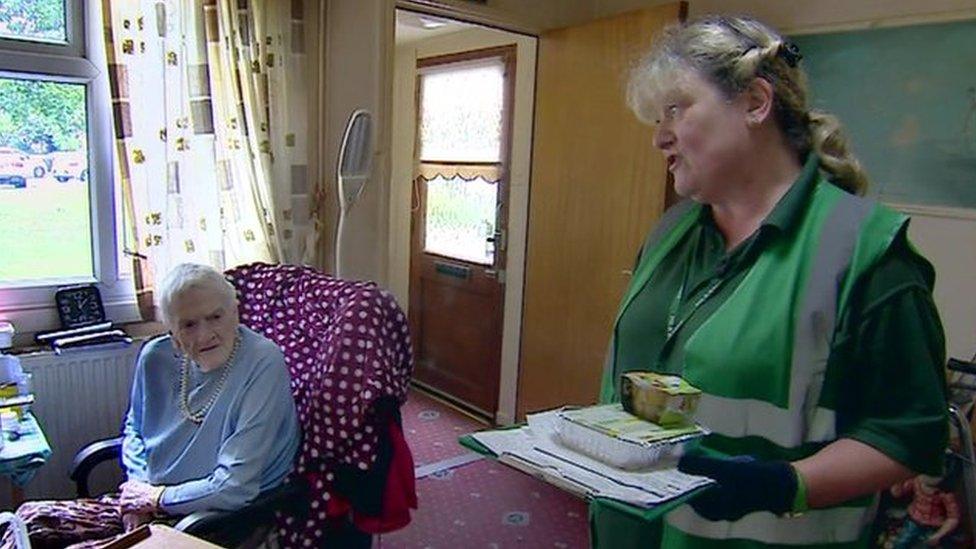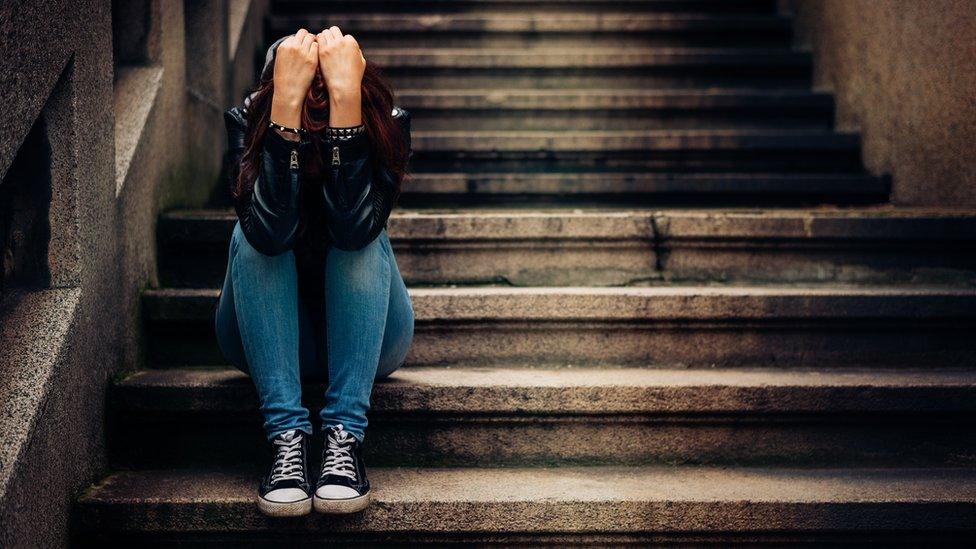Social work: 'I had a parent screaming foul names at me'
- Published

For Charlie, a children's social worker in London, conducting home visits can be like Russian roulette.
"I have had a parent screaming at me and calling me foul names whilst holding a bike lock," he says.
"I didn't know whether he would actually hit me, but he had been convicted of actual bodily harm (ABH).
"I still had to go back to that house a few days later to see the child."
The account of Charlie - not his real name - is one of many alarming examples of abuse experienced by social workers while in the line of duty.
Such accounts prompted the Social Worker's Union (SWU) to call for social workers to be covered by tougher new laws designed to protect emergency staff such as police officers and hospital workers.
The new laws, introduced last November, doubled the maximum prison term for common assault on emergency workers from six months to a year.
John McGowan, general secretary of the SWU, says social workers provide an "emergency function" and "a 24-hour service for children and vulnerable adults".
In response to the calls, the Ministry of Justice says it condemns attacks on social workers as "completely unacceptable" - but added courts can treat them as aggravated offences when sentencing., external
'Nobody seems to care'
Charlie, who works for a local authority, says in one case, seven police officers accompanied him to the house of a teenage gang member after he beat up his stepfather.
He says: "[Police] said the teenager's history of violence was genuinely dangerous.
"This was a house I had been going to about five times at that point, always unannounced, and I continued to go in alone afterwards."
Allison Hulmes said there was a rising problem of social workers being traced on social media and followed home
His colleagues have faced worse abuse, he says, citing one who was beaten up by teenage clients in their office and then had to stay in hospital with their abusers.
He believes the negative misconceptions around social workers partly fuel the hostility towards him and his colleagues.
He says: "It's getting harder and harder to do my job. Nobody seems to care about the good we do or the risks we face.
"People think we are just there to take their children away, which is not true.
"I've had quite a few parents threaten to ruin my career or sell stories to a tabloid newspapers - that scares me more than getting punched."
"I've helped women who've been really badly abused leave their partners; help abusive people change their behaviour, or help kids who are being sexually abused get out of those situations."
He believes that unlike police, social workers are not recognised for the risks they face.
He says: "A manager of mine described our job as: we go into houses that police find too dangerous to go into - by ourselves.
"We talk about stuff that police don't talk about and we don't have any of the gear the police have or any of the back-up they have, and nobody seems to know about that."
'He terrified me'
Around 80% of those entering the social work profession are female. , external
Keri O'Riordan, a trained social worker and professional officer for the British Association of Social Workers (BASW) says there is a culture of "bravado" in the profession that encouraged tolerating abuse.
Keri, a former child protection social worker for two-and-a-half years, says she was once abused by a father unhappy with her assessment of his family's case.
She says: "We had written out the concerns we had about the situation in clear language, and he didn't like what we said, so he screwed up the paper and threw it at me.
"I cried and hid in the toilets. He was a really big man and he terrified me.
"I remember being really ashamed that he had upset me, and that I had got upset in front of him.
She adds: "There is a culture of bravado that you shouldn't be frightened and you should just be able to get on with the job.
"It is a bit unfathomable that to do social work you should be able to tolerate being treated in a really frightening way, regularly.
Social workers on the hardest part of their job
Keri left her role in child protection to join BASW, saying burn out and compassion fatigue contributed to her decision.
"There's only so many times that your day-to-day life can be about peoples' difficult stories and trauma", she says. "It's a really hard job."
But Keri stresses that social workers prioritise helping traumatised clients, despite the potential for abuse.
She adds: "The child protection system can be really hard on families and it's really intrusive and stressful.
"Social workers really want to do what's best for families and the people that we work with.
"But it can be really dangerous, scary and emotionally taxing."
'We need more money'
SWU plans to make an official appeal for social workers to be included in the The Assaults on Emergency Workers (Offences) Act sometime after Britain's departure from the EU, which is currently scheduled for 31 October.
Currently, the workers included in the act, external are police officers, National Crime Agency (NCA) officers, prison officers, fire, search and rescue workers, and staff providing NHS health services.
The union say they have also gained "cross-party support" from 36 MPs for a parliamentary debate next year into the risks and working conditions faced by social workers.
Almost 40% of social workers said they were looking to leave the profession entirely, according to a survey, external of more than 3,000 social workers last August conducted by SWU, Bath Spa University and BASW.
The union said the main stressors for social workers are "high case and administrative loads, and a lack of resources for service users".
Mr McGowan adds: "If you've got social workers leaving the profession, then the existing workers are under pressure and trying to do as many visits as possible.
"They then might be taking on more vulnerable visits, so in a way they're getting these situations increasingly because of their workloads."
He adds that added funding was needed for local authorities and new posts for social workers.
He says: "If you don't have that adequate support you're less likely to have two social workers on a visit, and you might not have a fuller assessment.
"And you might have an inexperienced social worker going into a situation where a very experienced worker might be able to diffuse or handle an aggressive individual."
'Where do you stop?'
Labour MP Chris Bryant, who presented the private members' bill for the act, external, says it would cover social workers employed by the NHS.
He says: "I had to fight quite hard to get [the bill] as extensive as it is. It does cover quite a few social workers, because they would be effectively working for the NHS."
But SWU defends its stance, arguing that the "vast majority of social workers do not work for the NHS" and that the bill should protect the whole workforce.
There are around 80,000 social workers in the UK working for local authorities, agencies, the NHS or independently.

MP for Rhondda Mr Bryant says: "The trouble is, then where do you stop, why not include housing officers, why not include teachers [in the act]?"
But he adds he would support the union's calls for all social workers to be protected by the act.
- Published14 August 2019

- Published6 November 2018

- Published1 July 2019
